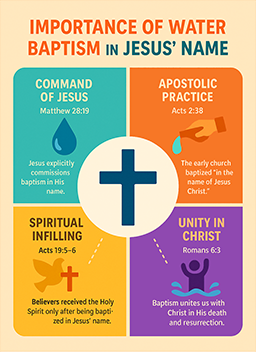Article
Search Articles
Listen
Download Article Study Sheet
Get the study sheet to review the highlights of this article.
Download SummaryRelated Articles
Get The Infographic
Get the full sized infopgraphic overview highlighting the key points discussed in this article.
Download Now
Popular Topics
Should We Baptize In The Name of The Father, The Son, and The Holy Spirit?
 Loading author...
Loading author...

Introduction
Click to expand
The God of the bible, has many names; each reflecting some characteristic of his state of being or nature.
Some of these names expose the innate properties of God that reflect his being apart from any of his
creations.
For instance, the personal name of God "YHWH", usually translated "I am" or "He is",
(although a precise interpretation of the name varies), it expresses the aseity of God; his
sovereign state of existence as progenitor.
Some of God's names reflect his characteristics
"relative" to his creation;
for example, "Jehovah-Mekoddishkem", which is interpreted; "the
LORD who sanctifies you" or Jehovah Rapha, interpreted as "The God who heals."
Just as the names of God reflect his state and nature,
the titles of God also describe his
characteristics, relative to his creations; for example, "King of Kings", "LORD of Lords",
"Alpha and Omega" , and "Ancient of Days" all describe God relative to his creations both
chronologically and in God's hierarchy of creation.
While reading the bible, it's important to remember the significance of the names and titles of God, particularly when it comes to water baptism. Jesus himself, states in
Jesus said in Matthew 28:19-20:
"Therefore go and make disciples of all nations, baptizing them in the "name" of
the Father [what's the name?] and of the Son[what's the name?] and of the Holy Spirit[what's the name?],
and teaching them to obey everything I have commanded you. And surely I am with you always, to the very
end of the age."
Unmistakably, Mark 16:16 draws a nexus between salvation and water baptism. We know the link exists in the "name" "Jesus", for a few reasons:
Jesus said in Acts 8:14-16:
“Now when the apostles which were at Jerusalem heard that Samaria had received the word of God, they
sent unto them Peter and John: Who, when they were come down, prayed for them, that they might receive the
"Holy Ghost:" (For as yet he was fallen upon "none" of them: "only" "they were baptized in the "name" of
the Lord Jesus." )”
This verse ALONE should be enough to "reconsider" the practice of baptizing using the titles , Father, Son, Holy Ghost. It should also convince one that the father, son and holy spirit are not three persons or three centers of consciousness in a shared essence or substance. The command (in Matthew 28:19-20) to Baptize using the name of the father, son and holy spirit merely points to the same numerically singular being (Matthew 1:18, John 10:30-33).
Key Takeaway:
After the resurrection of Jesus, the command given to the apostles was baptism in the "name" of Jesus.
The Holy Spirit At Ephesus
Click to expand
Jesus said in Acts 19:1-6:
And it came to pass, that, while Apollos was at Corinth,
Paul having passed through the upper coasts came to Ephesus:
and finding certain disciples, He said unto them, Have ye
received the Holy Ghost since ye believed? And they said
unto him, We have not so much as heard whether there be any
Holy Ghost. And he said unto them,
Unto what then
were ye baptized?
And they said, Unto John's baptism. Then said Paul, John verily
baptized with the baptism of repentance, saying unto the people,
that they should believe on him which should come after him, that
is, on Christ Jesus.
When they heard this, they were baptized in
the name of the "Lord Jesus."
And when Paul had laid his hands upon
them, the Holy Ghost came on them; and they "spake with tongues",
and prophesied
When Paul asked the believers at Ephesus if they had received the
Holy Spirit (the new birth) they replied they did not know if there
was such a thing as a holy ghost, having said that,
the first thing
Paul did was questioned their baptism as they had "NOT" received the
infilling of the Holy Spirit.
When the believers at Ephesus were
"re-baptized" in the name Jesus and Paul laid hands on them;
they
"then" received the Spirit of God, for the scriptures said they
heard them speak in tongues as the spirit gave utterance; which
is the evidence of the new birth.
In, considering the events at Ephesus, there is no reason to assume one can be born again, without going down in water in the name of Jesus. There are some that might argue that Cornelius is an example of someone who was filled with the spirit of God "without" being baptized in Jesus name. However, The bible states in
Jesus said in Acts 5:32:
And we are his witnesses of these things; and so is also the
Holy Ghost, whom God
GIVEN to "them that obey him."
God's consistency factor is one-hundred percent, and there is no reason to believe it will ever be anything else; the fact that Cornelius was filled "before" simply illustrates God's omniscience as he KNEW Cornelius would submit to baptism in Jesus' name.
Key Takeaway:
Although the believers at Ephesus were baptized, the Holy Spirit did not fall on the them until they were Baptized in the name Jesus.
Buried In The Name
Click to expand
Jesus said in Romans 6:3:
Know ye not, that so many of us as were baptized into "Jesus Christ" were baptized into
his"[singular] death? Therefore "we are buried with him[singular] by baptism into death:"
that like as Christ was raised up from the dead by the glory of the Father, even so we
also should walk in newness of life.
The bible makes clear that we are baptized into the death of Jesus Christ through emersion in water using the name Jesus. One cannot be baptized stating "I baptize you in the name of the King of Kings and Lord of Lords" and expect Jesus to acknowledge our burial in him; why? "King of Kings and Lord of Lord" is not the "name" of God (including his incarnation - Hebrews 1 :4).
While it might be tempting to cite Revelation 19:16(and verse 13) as proof that the titles of God "are" in fact "names" of God,
Jesus said in Revelation 19:13:
And he was clothed with a vesture dipped in blood:
and his "NAME"
is called "The Word of God".
Jesus said in Revelation 19:13:
And he hath on his vesture and on his thigh
a
"NAME" written, "King Of Kings, And Lord Of Lords".
It's important to clarify that the nuances between a title and a
personal name have significant differences.For example,
Collie is
the "name" of a dog breed; it describes a certain set of traits
shared by all dogs of that kind. However, it does not identify
any specific collie.
In contrast, the name
Lassie identifies a
particular dog within that breed. Similarly, King of Kings
describes "what" God is;
His supreme authority and rule
but not who He personally is. Only a personal name can do that.
While King of Kings speaks to His role as supreme ruler,
it cannot replace His personal identifier: the name Jesus.
The bible states in
Jesus said in John 14:13-14:
And whatsoever ye shall ask in my name, that will I do, that the Father may be
glorified in the Son. If ye shall ask any thing in my name, I will do it.
Jesus said in Acts 4:12:
Neither is there salvation in any other: for there is "none"
other "name" "under heaven" "given among men", "whereby we must be saved"
That "name" is not "Father", it is not "Son", and the only other name by which
we are saved is not "Holy Spirit." The name is "Jesus."
Deviating from the specified protocol for baptism given to the
apostles by Jesus (Matthew 28:19-20, Acts 2:38) nullifies the
power of baptism;
that includes baptism using any name OTHER
than the name Jesus (Acts 8:14-16, Acts 19:1-6).
Baptizing using the titles Father, Son, and Holy spirit was
not something that Jesus commanded, nor was it taught or
practiced by the apostles.
Even more interesting; if one
is going to baptized in the titles of God, why baptism
using only three titles; why not four of five or every
title of God.
There is no reason to apply "special status "to the titles "Father", "Son" , and "Holy Spirit" these are all descriptions of God's traits that all titles of God detail; They all point to the SAME being. Does the title "King of kings" in some way mitigate the title "The Most High God"? Do the titles of God fall into a hierarchy whereby one title is higher than another; how is that possible.
The Same God
Click to expand
Merriam-Webster's dictionary defines Manifest as: (adjective) readily perceived by the senses and especially by the
sense of sight. 2. (adjective) easily understood or recognized by the mind: "OBVIOUS" 3. (verb) to make evident or
certain by showing or displaying.
So, if these created things are " manifestations (evidence and reflections of)" of God,
through their existence and their characteristics, how could the " Father" be a
" manifestation" ; a manifestation of who, or what? Likewise the bible says that God
is a spirit and God is holy; so what distinctions could we make between God - the spirit
that is holy and the " Holy Spirit",
after all if the spirit is a "person" or a center of
consciousness; how can the the Holy Spirit be "God's" spirit? Matthew 1:18 makes clear
there is no distinction between the "Father" and the "Holy Spirit",
Tags: